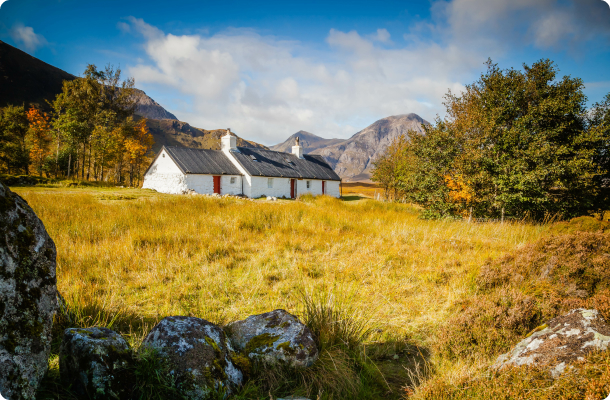Table of Contents
ToggleAre you planning a trip to Scotland? You don’t have to worry about not knowing where to begin – this guide provides all the essential knowledge you need to travel around Scotland with confidence. Our information will help you make the most of your Scottish adventure.
Top 5 things to do in Scotland
Scotland is a magical place filled with breathtaking views, centuries-old castles and picturesque villages. Planning your trip to Scotland will be made easier if you plan to explore the top 5 places and activities:
- Visiting Stirling Castle is an integral experience when travelling to Scotland as it towers atop one of the largest country parks in Europe. Immerse yourself in history and marvel at the grand architecture of this iconic landmark. You can also enjoy a day visit to nearby St Andrews golf course, home of golfing legends!
- When in Scotland, it’s essential to spend time exploring Edinburgh, Scotland’s capital city. Filled with cobbled streets and vintage buildings, Edinburgh boasts a wealth of culture from its many galleries and monuments. Take a tour around one of its many distilleries and taverns for some authentic whisky tasting or journey through Arthur’s Seat for some stunning views across the city.
- No trip would be complete without exploring magnificent attractions in the Scottish Highlands. Enjoy panoramic views from Suilven mountain or go mountain biking along Ben Nevis – both breathtaking experiences that will leave lasting memories! Discover the wild nature of Scotland – you can even take part in some island hopping from Oban Bay to reach the Isle of Skye; one of Europe’s most exclusive island clusters filled with wildlife spotting opportunities!
- A visit to Scotland is not complete without indulging in whisky tasting while there, so set time aside on your travels for this activity filled with robust flavour profiles and smooth single malts – perfect for appreciating Scotch whisky!
Follow these five essential activities when planning your next trip to Scotland for an unforgettable holiday full of adventure and spirit!
Choosing the best time of year to visit
When planning a trip to Scotland, it is important to consider the best time of year for your visit. Scotland has a temperate climate, with mild winters and relatively cool summers. The temperature and weather can vary significantly depending on what part of the country you’re traveling to, but generally speaking the most pleasant time of year tends to be between May and September. During these months you’ll find that the days are longer and temperatures tend to be comfortably mild.
Another factor to consider when planning your trip is peak travel times in Scotland. You’ll likely want to take into consideration the numerous festivals, events and holidays celebrated throughout the course of a year; they can get very crowded so plan accordingly! July is often a busy month as tourists flock to celebrate Edinburgh’s International Festival. The festivities in August include Military Tattoos held at Edinburgh Castle as well as Scotland’s famous Highland Games where athletes compete in traditional events such as throwing cabers and tug-of-war contests. As such, if avoiding crowds isn’t your thing then this could be an option for your Scottish holiday!
No matter what time of year you decide to visit or which festivals you choose, rest assured that Scotland has much beauty waiting for you all-year-round; its stunning landscape offers breathtaking views no matter when you go! Before booking your travel arrangements make sure you research what activities are available and read up on typical weather conditions throughout different parts of Scotland’s various regions – this will give you an excellent idea of which season works best for your travels!
Getting to Scotland: flights, trains, and road trips
The first step in planning your trip to Scotland is deciding on the best way to get there. While there are several airports in Scotland, most international flights will land in Edinburgh or Glasgow, both of which have major airports and train stations. Alternatively, traveling by road is an option for those wishing to explore additional parts of the UK.
When it comes to travel costs, booking in advance can often save money. Generally, prices tend to increase closer to the date of travel and while discounts may be available there may be restrictions on times or routes. Those taking a road trip should factor in fuel costs and consider toll fees for motorways if applicable.
Once you have arrived at your destination, you will need to decide how you are going to get around during your stay. Scotland offers a range of transportation options such as buses and ferries that allow visitors easy access to all this beautiful country has to offer at reasonable rates. Furthermore, some cities also offer transportation loyalty cards which provide discounted fares upon registration and are valid across multiple operators.
No matter what transport option you choose when visiting Scotland, planning ahead is key. Additionally it can be helpful considering all the alternatives available as well expenses before making a final decision.
Getting around Scotland: transportation options
Getting around Scotland can be an enjoyable and convenient experience when you’re aware of the transportation options available. Fortunately, public transportation is widely available throughout Scotland, which allows travelers to easily commute between cities and major attractions. The main forms of public transportation available are bus services and train networks, with a variety of tickets and routes to choose from while exploring the area.
For travelers who wish to explore further afield or have more flexibility during their trip, renting a car or campervan may be the best option. Rentals are widely available in airports or major cities and offer access to remote areas not reachable by public transport without long trips. Booking in advance is recommended due to high demand in peak season. Additionally, remember that traffic circulates on the left side of the road in Scotland so be prepared for this difference when driving around!
Finally, using ride-sharing apps or taxi services can also be an efficient way of getting to your destination quickly when time is tight. This option is especially useful if you’re traveling between cities late at night as few bus services operate after 11 PM. Keep your journey safe by always ensuring it’s properly booked with a licensed service provider before entering any vehicle. Enjoy your trip around Scotland and stay safe on the road!
Weather and what to pack
Scotland is well known for its wild, unpredictable weather and its months of drizzle. While temperatures vary seasonally and regionally in Scotland, the average temperature ranges from 40-50 degrees Fahrenheit (5-10 degrees Celsius). This means it can get quite cold at certain times of the year, so it’s important to pack warm clothing and gear in anticipation of this changeable climate.
The amount of rain varies depending on where you visit in Scotland, with western regions generally experiencing more rainfall than eastern areas. It’s a good idea to bring waterproof gear no matter where you go, as even a sunny day can quickly become overcast and wet. However, the United Kingdom has fairly mild winters overall when compared to other nations in the same latitude range.
Aside from how cold or wet it gets during your journey, wind can also be an issue when visiting Scotland due to its coastal location. Plan for strong gusts of wind that may cause sudden drops or even extreme changes in weather conditions. Be sure to wear layers to accommodate shifts in temperature and keep your rain gear easily accessible. Don’t forget a hat; even on sunny days they’re essential for keeping warm if you plan on exploring the towns or spending time outdoors!
Visa and passport requirements
Before planning a trip to Scotland it is important for travelers to ensure they meet the entry requirements and are adequately prepared. All travelers must have a valid passport, and may need a visa depending on their country of origin. If a visa is required, visitors should be aware of the application process and check if there are any fees associated with their particular visa. Most visas are granted for 30 days or less, but visitors can apply for an extension or renewal of their visa if needed.
If potential travelers require advice pertaining to entry requirements and/or permits that could affect their stay in Scotland they should contact the UK Embassy in order to get the most accurate information on what documents are accepted by border control. Additionally, foreign nationals can use the UK government’s online tool which allows them to determine if they need a visa or permit for certain countries including Scotland.
Visitors should ensure that all necessary paperwork is acquired well in advance in order to avoid delays at immigration when traveling internationally; specifically when visiting Scotland. Having all pertinent documents gives travelers peace-of-mind and allows them to focus on planning a memorable trip!
Currency and cost of living
When planning a trip to Scotland, it is important to prepare for the currency and cost of living during your visit. The official currency used in Scotland is the British pound (GBP). When making financial transactions, we recommend carrying cash and a credit/debit card (with contactless payment) as these are most widely accepted. Cash machines are available in most towns and cities, accepting cards from UK banks, Visa, Mastercard and Cirrus. Also note that the ATMs in remote areas may charge additional fees.
It is important to accurately budget for the cost of living while visiting Scotland. Prices for basic commodities such as food and accommodation will vary depending on where you stay within Scotland. In larger cities like Glasgow and Edinburgh, costs tend to be higher than rural areas or smaller towns but there is usually still an array of options to suit different budgets.
As for tipping etiquette when travelling in Scotland, it’s standard practice to tip around 10% of your bill at restaurants or cafes if you’re satisfied with the service you received – although this isn’t mandatory; skimping isn’t acceptable either! In pubs or bars tipping isn’t expected unless services have gone beyond expectation – typically bar staff serving drinks aren’t tipped in these types of establishments. When using cabs or hired transport services, a small gratuity typically 5-10% after deducting any applicable taxes is appreciated by the driver if they have provided safe and friendly service during your journey.
Phones and internet access
When planning a trip to Scotland, it is important to keep in mind the access needs of phones and other electronic devices while you are away. Due to the rural and sometimes remote nature of Scotland, wifi availability may be limited. It is best to plan ahead and purchase a prepaid sim card that can connect you to the internet no matter where you go.
Alternatively, if possible, find out what wifi access will be available where you are staying in advance. Ask hotel reception or your hostel if they offer free wifi or have access points available for purchase so that you can stay connected on-the-go. If desperate, your best bet may be searching for cafes or restaurants which offer free public wifi access using services such as Sky Broadband Hotspots.
It’s always useful to check with your chosen provider about international roaming policies before leaving for Scotland as well as check out other answers from users who have been in the same situation via social media platforms such as Twitter. Always update your profile with relevant information about where you are going during your time abroad so that online friends are aware of your travel plans.
Regardless of the route taken, make sure you stay connected so that you can get the most out of your experience while visiting Scotland!
Where to find helpful tourist information
Planning your trip to Scotland can be an exciting venture, but it’s important to be aware of the necessary tourist information you might require along the way. Fortunately, there are several resources available to help make your journey easier. From tourist information centers to online communities and forums, Scotland offers a wide range of helpful travel guides and advice when visiting the country.
One of the best ways to find useful information is by visiting a Tourist Information Center. These centers are operated through local authorities and provide visitors with free and accurate advice as well as travel leaflets, maps, brochures and other helpful materials.
Alternatively, there are several online resources that offer valuable insights on what destinations to visit while in Scotland. You can search forums or join online communities on places like TripAdvisor where people who have been there before can provide their personal recommendations for those planning trips there. Additionally, comparison websites such as Expedia or Travelzoo can help you find budget-friendly hotels or attractions based on their ratings.
Tourist Information Centers and online resources are both great sources for finding out more about each destination that you plan on visiting during your time in Scotland. Take the time to use these tools before planning any trip so that you have all of the essential information at hand!
Tips for staying safe while traveling
The key to having a safe, enjoyable and memorable trip to Scotland is to plan ahead, take basic precautions and be prepared for emergencies. When traveling to Scotland’s urban areas, visitors should take a few extra safety measures. Here are tips for keeping your mind at ease on your next journey:
- Map out your route ahead of time and travel with other people whenever possible. Keep the cost of your journey in mind when selecting lodging and transportation options – leverage public transportation or car share services whenever possible when visiting cities.
- Familiarize yourself with the local laws, customs and regional cultural differences before embarking on your trip – what may not be considered acceptable behavior in one destination could be seen as extremely offensive in another region of Scotland. Respect local customs and try blending into the culture for a truly unique travel experience.
- Make sure you have an active phone plan that allows international calls in case of emergency situations- requesting help might require an international call if necessary – while also keeping family and friends back home updated throughout your travels.
By staying aware of these tips while traveling throughout Scotland, guests can ensure they journey safely – creating lasting memories along the way!
Understanding the Scottish emergency services
When traveling to Scotland, it’s important to familiarize yourself with the country’s emergency services. In the event of an emergency, it is essential to know who to contact and the Scottish emergency phone numbers you can use when needed. These numbers should be written down or saved in your phone for easy access in case of a crises, especially if you are travelling in remote areas.
In Scotland, you can call 999 or 112 from any phone and ask for Fire, Police or Ambulance services if something unexpected happens. You will also be able to speak to someone who can provide advice on other matters such as security concerns or medical emergencies. When calling these numbers make sure to memorize as much information about your exact location as possible such as detailed street name, nearby landmark and even postcode when possible – this information is always helpful in assisting you faster during an emergency.
It’s also important that newcomers understand that dialing these numbers should only be used during an actual emergency situation; they cannot be used for booking a taxi or attending any urgent requests not related with risk of life or wellbeing.
And remember – Although accidents and challenges may occur while on vacation – being prepared by understanding the offered emergency services will help ensure a safe visit every time!





